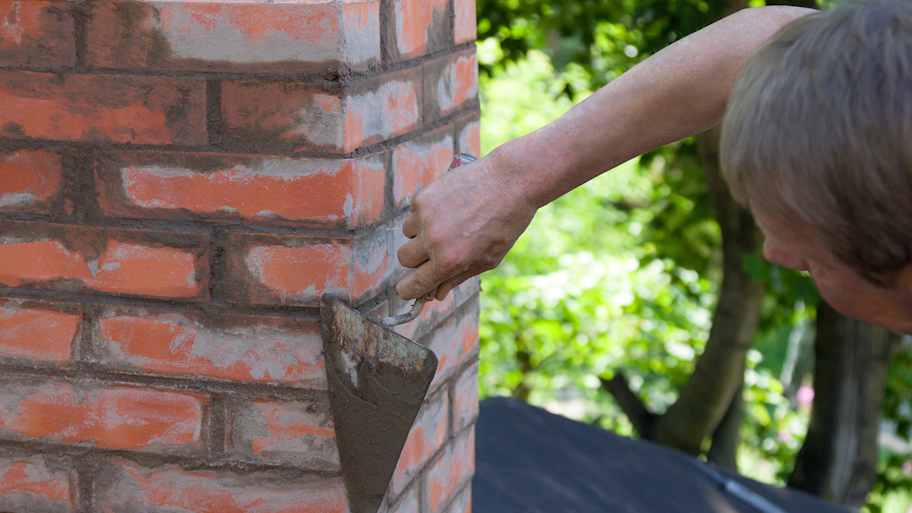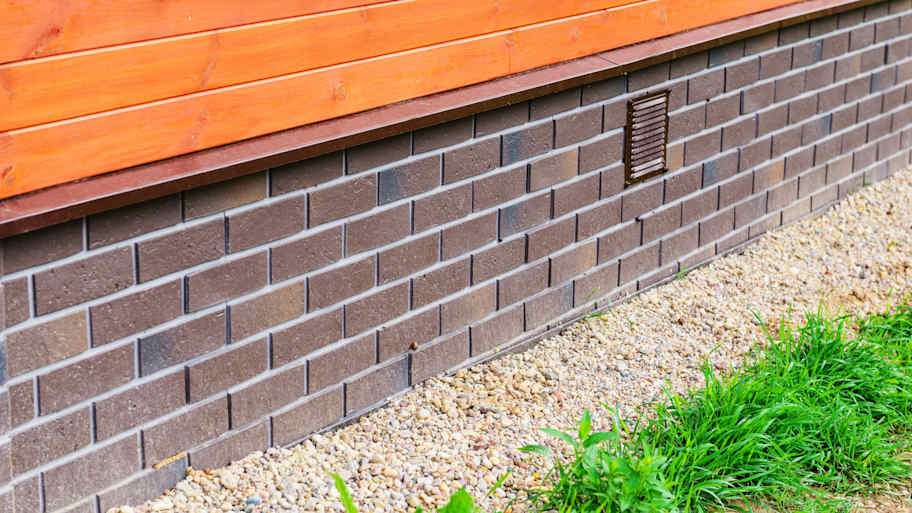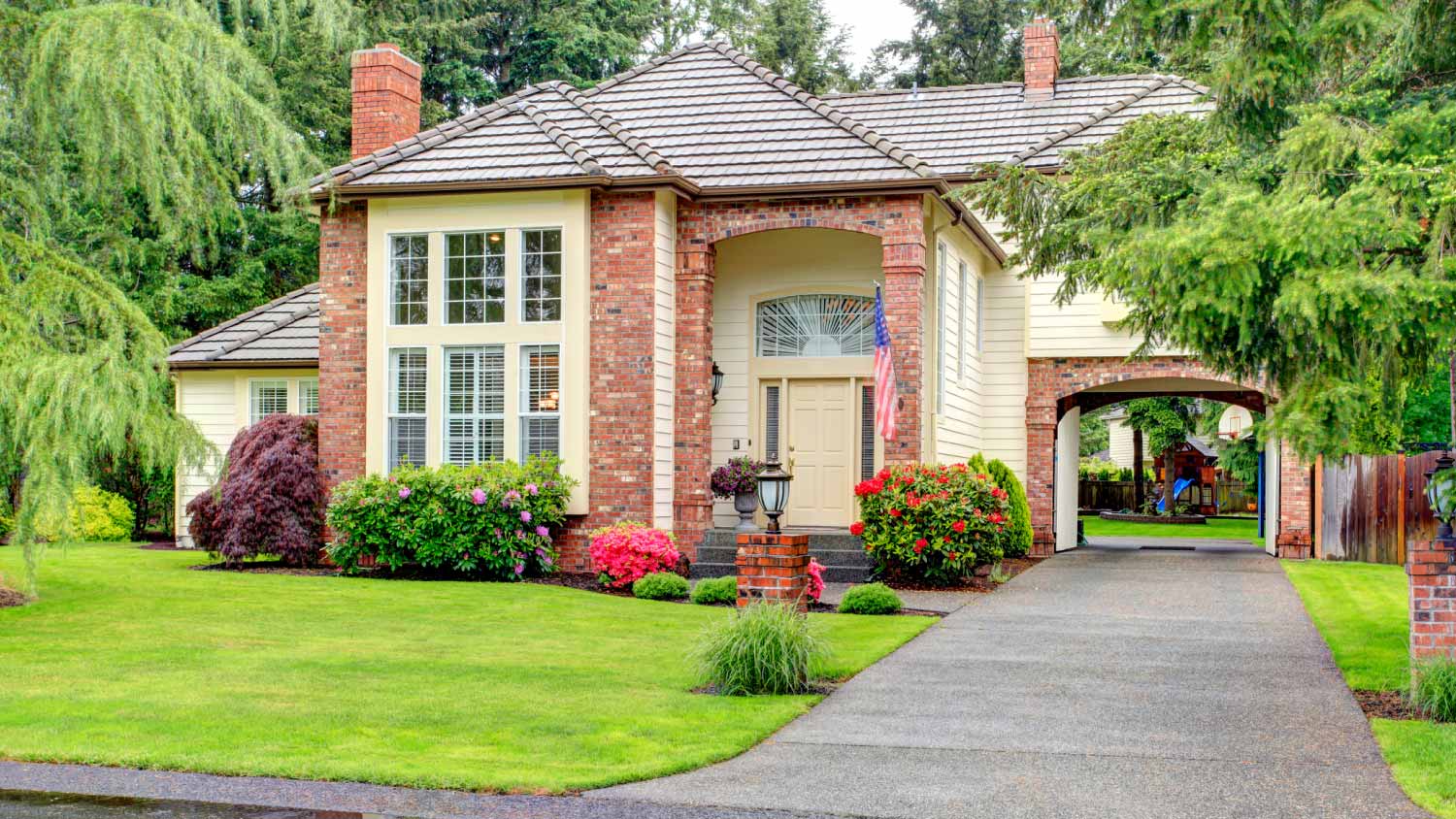
Discover the average stone restoration cost, including price ranges and key factors, to help you plan your next home project with confidence.
The glue that holds it all together


Type S mortar is stronger and more durable, which is ideal for structural and below-grade applications.
Type N mortar is a more DIY-friendly option because it's easier to mix, apply, and shape.
Type S stands up better to pressure, moisture, and extreme weather, offering superior long-term performance.
Choosing the right mortar is just as important as selecting the right materials when working with brick, stone, or block. Type N and Type S mortars are two of the most common masonry materials. While they look similar, their differences in strength, durability, and workability can significantly impact appearance and longevity if not used for the right application. Breaking down the differences between Type N versus Type S mortar can help you decide the best fit for your next masonry project.
Type N and Type S mortars feature different strengths that are suited for specific uses. Type N mortar is a medium-strength mix used for above-grade, exterior walls and soft stone or brickwork. It's more flexible and better suited to withstand minor movement or weather exposure. Type S mortar is stronger and more durable and is best suited for load-bearing walls, retaining walls, foundations, and other below-grade applications where higher compressive strength is needed.

Type N mortar is a medium-strength, general-purpose mortar made by combining one part cement, one part lime, and six parts sand. It’s used in residential construction on exterior walls, chimneys, and interior load-bearing installations. The mortar is a popular choice for brick, block, and stone masonry in standard building conditions.
| Pros | Cons |
|---|---|
| Suitable for above-grade, exterior, and interior uses | Not strong enough for heavy structural or below-grade applications |
| Easy to work with and apply | Lower compressive strength than Type S |
| Ideal for soft stone and older brick | Less resistant to soil pressure |
| Widely available | May deteriorate faster in high-moisture areas |
Best for:
Exterior brick walls
Chimneys
Interior load-bearing installations
Type N mortar is strong enough to handle most standard load-bearing walls and has enough give to tolerate minor shifts or changes in temperature without cracking. The mortar is a solid option for exterior walls, chimneys, and stone veneers. The mix of cement, lime, and sand creates a strong bond while staying easy to work with, which is great for DIY projects. When learning how to fix brick mortar, Type N is suitable for DIY repairs.
Type N mortar pairs well with softer materials like old brick or natural stone. Because it isn’t overly rigid, it won’t damage more delicate masonry units over time. This makes it particularly useful for historic restorations or projects where aesthetic preservation is important. Its widespread availability and reliability make it a go-to mortar for many above-grade applications in new builds and repairs.
Type N mortar is strong enough to handle certain uses, but it has a lower compressive strength than S mortar. The material isn’t suitable for below-grade applications like foundations, retaining walls, or areas subject to significant weight or soil pressure. Premature cracking or structural failure can occur if Type N mortar is used in those situations.
Type N mortar can degrade faster than stronger alternatives in harsher environments such as frequent freeze-thaw cycles or high moisture exposure. It’s not as resistant to the stress that comes from shifting soil, water infiltration, or heavy loads. So while it excels in moderate conditions, it’s not the best choice when durability and strength are critical.

Type S is a high-strength mortar mix made with two parts cement, one part lime, and nine parts sand. It's designed for structural applications and in projects that require greater load-bearing capacity. Type S mortar is popular in below-grade construction, such as foundations, retaining walls, and masonry that comes into contact with soil.
| Pros | Cons |
|---|---|
| Suitable for below-grade use, including foundations and retaining walls | Harder to work with compared to Type N |
| Holds up well under soil pressure and lateral loads | Risk of cracking with softer masonry materials |
| Resistant to harsh weather and freeze-thaw cycles | Less forgiving during application |
| Versatile for indoor and outdoor use | May not be ideal for historic restorations or delicate stonework |
Best for:
Exterior load-bearing walls
Foundations
Retaining walls and masonry patios
Type S mortar has high compressive strength, which makes it ideal for heavy-duty structural applications. It’s commonly used in foundations, retaining walls, and other below-grade projects where soil pressure, moisture, and weight are constant challenges. Type S mortar improves a building's durability with a strong, lasting bond between masonry units.
Resistant to extreme weather conditions, Type S mortar holds up against freeze-thaw cycles, wind, and moisture exposure. The mortar is especially useful in outdoor settings and climates with harsh winters. Type Sr’s durability helps ensure the integrity and safety of the build whether it’s supporting a patio, a load-bearing wall, or a structure in a high-wind or seismic zone.
Type S mortar can be challenging to work with because of its thick consistency and high bonding power. If not mixed or applied properly, it can set too quickly or create uneven joints, which can impact the final result. The mortar isn't ideal for materials that expand and contract or for older brick and stone that could crack under pressure, because the increased strength means it’s less flexible.
Not every project calls for such high strength, so using Type S can be overkill. Using Type S for softer or more decorative masonry elements can lead to increased material costs and reduced compatibility. For non-structural projects or restorations, a flexible mortar like Type N avoids damage while maintaining the building's intended look and function.
Type N mortar is easier to work with for DIY projects because of its smooth texture and long working time. Type S mortar is more challenging to mix and apply due to its thicker consistency and faster setting time. It's best to hire a local masonry company for projects that require Type S mortar rather than DIYing it.
Type N mortar finishes smoothly and is easier to tool, making it popular for decorative brickwork and veneers. Its softer texture delivers cleaner joints and a more polished look. Type S mortar may not provide a refined finish because it's harder to work with.
Type N mortar offers more colors and finishes to provide a better fit for aesthetic applications like facades and decorative stonework. Its workability allows for more precise joint styling and easier mixing with tints or additives. Type S is more function-driven, so while it can be customized, it’s chosen for strength over appearance.
Type S mortar is more durable than Type N, thanks to its higher compressive strength and resistance to soil pressure, moisture, and harsh weather. It’s built to handle structural loads and below-grade conditions. Type N is still durable for general use, but doesn’t hold up as well under heavy stress or in extreme conditions.
Depending on how much mortar you need, Type N mortar is more affordable than Type S in terms of material cost and ease of application. It’s less labor-intensive, which can help reduce overall project expenses. Type S mortar is more expensive due to the higher compressive strength.
Mayflower was an excellent choice for the complete renovation of my condominium. They knew exactly how to deal with the complexities of the condo building and management to make the project very smooth, easy and done right. From start to finish, everyone was incredibly helpful and their...
Amazing work been using this company since over 10 years amazing people to deal with great prices fixed all my homes that I own highly recommend
Reliable, trustworthy, efficient! I canâ t say enough about how pleased I am with the service this company offers. Highly recommend!
Excellent company with a great team. John from a1 masonry contractors is knowledgeable, professional, creative and precise. I Was immediately impressed by his whole approach. It's so refreshing to work with folks who are not only striving for perfection, but actually executing it on an...
Great experience from start to finish. Sam and their roof crew chimney masonry did an amazing job. They repaired our roof chimney. They gave us a fair price and were very patient with the many questions we asked. They respond very quickly and their products are superior with a great...
Great service, great price, very knowledgeable.
Excellent sales staff and installer. Easy to work with. I appreciated that my current system was able to be activated and used.
Professional, courteous and great quality. Would hire the team again.
Job came out very nice and within time frame requested. The contracted masonry crew was very professional and accomodating. They asked questions and made sure we got exactly what we wanted. My only suggestion is to know ahead of time exactly what you want so you can give specific...
I found them on Angie's List. They do a good job and I am still using them. The owner is on it, really nice and flexible. This last year I have given them a lot of work. They are handling everything well. They do landscaping, tree service and masonry walls. They are reasonable, the quality is...
From average costs to expert advice, get all the answers you need to get your job done.

Discover the average stone restoration cost, including price ranges and key factors, to help you plan your next home project with confidence.

The cost to brick a house depends on several factors, like labor costs, home size, and brick types. Use our guide to estimate your bricking costs.

The cost to replace brick front steps depends on the type of brick, square footage, pattern, and more. Learn how much you may spend on this project.

The steps for how to repoint brickwork aren’t necessarily difficult, but they do stack up quickly. See what this project entails to determine whether it’s best left to a pro.

Discover what cobblestone is, its types, history, and the unique process of making this enduring and charming paving material.

Keystone is a structural concept that dates back thousands of years. But what is a keystone in masonry, and how is it used today?